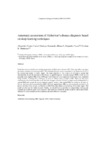Mostrar o rexistro simple do ítem
Automatic Assessment of Alzheimer’s Disease Diagnosis Based on Deep Learning Techniques
| dc.contributor.author | Puente-Castro, Alejandro | |
| dc.contributor.author | Fernández-Blanco, Enrique | |
| dc.contributor.author | Pazos, A. | |
| dc.contributor.author | Munteanu, Cristian-Robert | |
| dc.date.accessioned | 2020-05-21T12:20:00Z | |
| dc.date.issued | 2020-05 | |
| dc.identifier.citation | Puente-Castro A, Fernandez-Blanco E, Pazos A, Munteanu CR, Automatic assessment of Alzheimer’s disease diagnosis based on deep learning techniques. Comput Biol Med. 2020; 120:103764 | es_ES |
| dc.identifier.issn | 1879-0534 | |
| dc.identifier.uri | http://hdl.handle.net/2183/25616 | |
| dc.description.abstract | [Abstract] Early detection is crucial to prevent the progression of Alzheimer’s disease (AD). Thus, specialists can begin preventive treatment as soon as possible. They demand fast and precise assessment in the diagnosis of AD in the earliest and hardest to detect stages. The main objective of this work is to develop a system that automatically detects the presence of the disease in sagittal magnetic resonance images (MRI), which are not generally used. Sagittal MRIs from ADNI and OASIS data sets were employed. Experiments were conducted using Transfer Learning (TL) techniques in order to achieve more accurate results. There are two main conclusions to be drawn from this work: first, the damages related to AD and its stages can be distinguished in sagittal MRI and, second, the results obtained using DL models with sagittal MRIs are similar to the state-of-the-art, which uses the horizontal-plane MRI. Although sagittal-plane MRIs are not commonly used, this work proved that they were, at least, as effective as MRI from other planes at identifying AD in early stages. This could pave the way for further research. Finally, one should bear in mind that in certain fields, obtaining the examples for a data set can be very expensive. This study proved that DL models could be built in these fields, whereas TL is an essential tool for completing the task with fewer examples. | es_ES |
| dc.description.sponsorship | This work is supported by the “Collaborative Project in Genomic Data Integration (CICLOGEN)” PI17/01826 funded by the Carlos III Health Institute in the context of the Spanish National Plan for Scientific and Technical Research and Innovation 2013–2016 and the European Regional Development Funds (FEDER)—”A way to build Europe”. This project was also supported by the General Directorate of Culture, Education and University Management of Xunta de Galicia (Ref. ED431G/01, ED431D 2017/16), the “Galician Network for Colorectal Cancer Research” (Ref. ED431D 2017/23), Competitive Reference Groups (Ref. ED431C 2018/49) and the Spanish Ministry of Economy and Competitiveness via funding of the unique installation BIOCAI (UNLC08-1E-002, UNLC13-13-3503) and the European Regional Development Funds (FEDER) | es_ES |
| dc.description.sponsorship | Xunta de Galicia; ED431G/01 | es_ES |
| dc.description.sponsorship | Xunta de Galicia; ED431D 2017/16 | es_ES |
| dc.description.sponsorship | Xunta de Galicia; ED431D 2017/23 | es_ES |
| dc.description.sponsorship | Xunta de Galicia; ED431C 2018/49 | es_ES |
| dc.language.iso | eng | es_ES |
| dc.publisher | Elsevier | es_ES |
| dc.relation | info:eu-repo/grantAgreement/ISCIII/Plan Estatal de Investigación Científica y Técnica y de Innovación 2013–2016/PI17%2F01826/ES/PROYECTO COLABORATIVO DE INTEGRACION DE DATOS GENOMICOS (CICLOGEN). TECNICAS DE DATA MINING Y DOCKING MOLECULAR PARA ANALISIS DE DATOS INTEGRATIVOS EN CANCER DE COLON/ | |
| dc.relation | info:eu-repo/grantAgreement/MEC/Plan Nacional de I+D+i 2008-2011/UNLC08-1E-002/ES/Infraestructura computacional para la Red Gallega de Bioinformática | |
| dc.relation | info:eu-repo/grantAgreement/MINECO/Plan Estatal de Investigación Científica y Técnica y de Innovación 2013-2016/UNLC13-1E-2503/ES/Plataforma HPC-PLUS para aplicaciones biomédicas | |
| dc.relation.uri | https://doi.org/10.1016/j.compbiomed.2020.103764 | es_ES |
| dc.rights | Atribución-NoComercial-SinDerivadas 4.0 Internacional | es_ES |
| dc.rights.uri | http://creativecommons.org/licenses/by-nc-nd/4.0/ | |
| dc.subject | Alzheimer | es_ES |
| dc.subject | Deep learning | es_ES |
| dc.subject | MRI | es_ES |
| dc.subject | Sagittal | es_ES |
| dc.subject | ANN | es_ES |
| dc.subject | Transfer learning | es_ES |
| dc.title | Automatic Assessment of Alzheimer’s Disease Diagnosis Based on Deep Learning Techniques | es_ES |
| dc.type | info:eu-repo/semantics/article | es_ES |
| dc.rights.access | info:eu-repo/semantics/embargoedAccess | es_ES |
| dc.date.embargoEndDate | 2021-04-18 | es_ES |
| dc.date.embargoLift | 2021-04-18 | |
| UDC.journalTitle | Computers in Biology and Medicine | es_ES |
| UDC.volume | 120 | es_ES |
| UDC.startPage | 103764 | es_ES |
Ficheiros no ítem
Este ítem aparece na(s) seguinte(s) colección(s)
-
INIBIC-RNASA-IMEDIR - Artigos [47]
-
GI-RNASA - Artigos [196]






